Activity Level: Above Average
Hypoallergenic: No
Social Ability: Selectively Social
Skills: Working, Guarding
Intelligence: Above Average
Ideal Climate: Temperate, Cool, Dry
Equally affectionate and fiercely loyal, Rottweilers are outstanding companion pets and workers. Whether they are pulling their weight on a homestead or protecting their family in the backyard, you can trust a Rottie to follow your command with a smile on their face.
Breed Overview
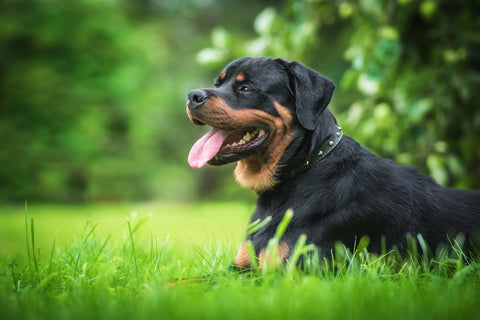 Origin: While most canine breeds’ origins begin in recent centuries, the Rottweiler is believed to have originated in ancient Rome. They were kept as herding and driving dogs, protecting humans and cattle on long trips through the Alps. Rotties also pulled sleds through the snow in the winter and guarded livestock and homes, proving themselves useful in nearly every canine task. These dogs roamed the region known as Rottweil, from which they would eventually get their name, and bred naturally with other native canines. Before long, their natural pulling capabilities were coveted by butchers for pulling heavy meat carts, and thus they gained the moniker Rottweil Butcher’s Dogs. They would live relatively normal and happy lives as working dogs for centuries, though documentation is unfortunately scant. Later, when modern war efforts neared their fever pitch, canines of several breeds would be drafted into the rank and file.
Origin: While most canine breeds’ origins begin in recent centuries, the Rottweiler is believed to have originated in ancient Rome. They were kept as herding and driving dogs, protecting humans and cattle on long trips through the Alps. Rotties also pulled sleds through the snow in the winter and guarded livestock and homes, proving themselves useful in nearly every canine task. These dogs roamed the region known as Rottweil, from which they would eventually get their name, and bred naturally with other native canines. Before long, their natural pulling capabilities were coveted by butchers for pulling heavy meat carts, and thus they gained the moniker Rottweil Butcher’s Dogs. They would live relatively normal and happy lives as working dogs for centuries, though documentation is unfortunately scant. Later, when modern war efforts neared their fever pitch, canines of several breeds would be drafted into the rank and file.
As tensions rose throughout Europe in the early twentieth century, many countries saw an increased need for military and police dogs which included German Shepherds, Bulldogs, Rottweilers, and a few other breeds. Rotties would serve in various roles such as pulling, guarding, and carrying messages, though few if any saw combat. In Germany, multiple organizations came about in support of Rottweilers as companion dogs, and these groups worked to preserve the inviolability of the breed. European breeders spent decades working with the best Rottweiler stock to breed strong, intelligent new generations. Rottweilers were officially recognized by the American Kennel Club in 1931 when they became popular in the United States.
History: After war efforts dwindled in the mid-twentieth century, the need decreased for strong, fast, intimidating canines. Instead, the need for highly trainable herding, guarding, and police dogs grew as Europe rebuilt itself. Rottweilers lived happy lives for decades filling these roles all over North America and Europe, and they slowly climbed the ranks of popularity over time. By the 1990’s, the breed was named first place for top dog adoptions according to the American Kennel Club, and they remain in the top ten as of 2021.
Breed Attributes
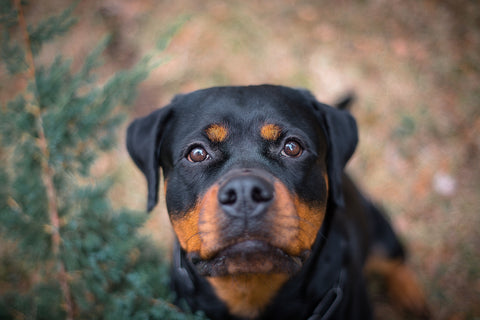 Temperament: Rottweilers may be perceived as intimidating due to their stature and size, but their breed standard tells a different story. According to the breed standard, “a calm, confident and courageous dog with a self-assured aloofness that does not lend itself to immediate and indiscriminate friendships. A Rottweiler... is an intelligent dog of extreme hardness and adaptability with a strong willingness to work...” In other words, Rottweilers have always been outstanding companions and workers, and their intelligence does not go unnoticed by their handlers.
Temperament: Rottweilers may be perceived as intimidating due to their stature and size, but their breed standard tells a different story. According to the breed standard, “a calm, confident and courageous dog with a self-assured aloofness that does not lend itself to immediate and indiscriminate friendships. A Rottweiler... is an intelligent dog of extreme hardness and adaptability with a strong willingness to work...” In other words, Rottweilers have always been outstanding companions and workers, and their intelligence does not go unnoticed by their handlers.
However, a Rottie may not be the dog for everyone, as they need plenty of exercise, mental stimulation, and leadership from their owner. The American Rottweiler Club says, “For us, Rottweilers are the best breed in the world, but we firmly believe they are not a dog for everyone. Rottweilers require a calm, stable and firm ‘pack leader’ or they will assume that role for you.” This is to say that Rottweilers need a strong leader that they can follow, otherwise they may act out.
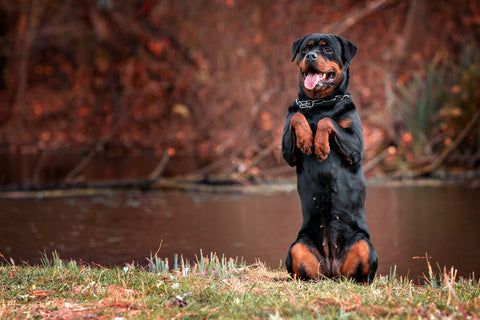 As many dog owners know, the stigma surrounding many dog breeds including Rottweilers is not baseless but can be harmful. While it is a fact that dogs can be dangerous if untrained, any animal can act out towards another animal or a human if provoked or fearful. Rottweilers make up a little over one percent of the dog population in the US but account for over 10% of dog bites. Though correlation is not the same as causation, it is also important to note that several other breeds at the top of attack counts are also from Mastiff, Bulldog, and similar muscular type breeds. These canines are incredibly strong and tend to be willful; without a strong leader in their owner, obedience training, and general safety, any dog can act unpredictably.
As many dog owners know, the stigma surrounding many dog breeds including Rottweilers is not baseless but can be harmful. While it is a fact that dogs can be dangerous if untrained, any animal can act out towards another animal or a human if provoked or fearful. Rottweilers make up a little over one percent of the dog population in the US but account for over 10% of dog bites. Though correlation is not the same as causation, it is also important to note that several other breeds at the top of attack counts are also from Mastiff, Bulldog, and similar muscular type breeds. These canines are incredibly strong and tend to be willful; without a strong leader in their owner, obedience training, and general safety, any dog can act unpredictably.
Taking everything into account, Rottweilers are not for everyone. Adopting a Rottie is not only a responsibility for pet care but also for leadership, companionship, and discipline. Rottweilers, Pitbulls, Mastiffs, and all large dogs rely heavily on their humans, but they will repay you with loyalty, love, and companionship.
For more information about Rottweilers, their needs, and how to keep them happy and healthy, we recommend checking out any of these fine organizations: American Rottweiler Club, Rottweiler Health Foundation, Rottweiler Rescue Foundation.
 Personality: While every dog is different, you can count on a Rottweiler to be loyal, sweet, and confident. These canines may seem aloof, but that is their defense mechanism to stay safe and comfortable in their environment. Once they trust a new friend, human or animal, the goof-ball switch turns on and they’re ready to play. Once they have been introduced to new friends, whether they are human or animal, Rotties tend to loosen up and get comfortable fairly quickly. As mentioned above, Rottweilers must be trained before meeting people or pets, and all children should be taught how to interact with and respect animals prior to meeting.
Personality: While every dog is different, you can count on a Rottweiler to be loyal, sweet, and confident. These canines may seem aloof, but that is their defense mechanism to stay safe and comfortable in their environment. Once they trust a new friend, human or animal, the goof-ball switch turns on and they’re ready to play. Once they have been introduced to new friends, whether they are human or animal, Rotties tend to loosen up and get comfortable fairly quickly. As mentioned above, Rottweilers must be trained before meeting people or pets, and all children should be taught how to interact with and respect animals prior to meeting.
Their above-average intelligence lends itself to an increased need for mental stimulation to stave off boredom. Especially if left home alone, your Rottie should have access to interactive toys such as puzzles and treat hiders to keep them occupied. A lack of interactivity can lead to pent-up energy, frustration, and eventually bad behaviors such as getting into the trash. Be sure your Rottie has toys, outdoor time, and socialization in their routine to keep them happy and mentally healthy.
Ideal Owner: You! Rotties need a strong leader to follow, to play with, and to snuggle with. If you’re up to the task, we recommend checking out these resources for finding adoptable Rotties near you: Recycled Rotts, Mid-American Rottweiler Rescue, and R.E.A.L. Rottweiler Rescue.
Fur Care
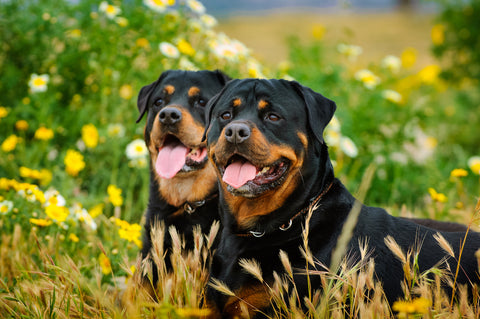 Grooming: A Rottie’s coat is short and smooth, so at-home grooming is easy. A soft bristled brush helps remove dead skin and loose fur and helps stimulate blood flow to the skin, two essential steps for maintaining healthy skin.
Grooming: A Rottie’s coat is short and smooth, so at-home grooming is easy. A soft bristled brush helps remove dead skin and loose fur and helps stimulate blood flow to the skin, two essential steps for maintaining healthy skin.
A simple bath every week or as needed may be all you need to keep your Rottweiler clean and fresh. Our Oatmeal Aloe Shampoo for Rottweilers cleanses the skin and flushes the coat, leaving your dog feeling and smelling fresh. This formulation is gentle, non-medicated, and safe to use as often as needed.
Shedding: Rotties have short fur but do shed quite a lot. Brushing their coat regularly helps remove loose fur before it ends up on your carpet. If your dog is shedding more than the average Rottweiler, they may need more essential fatty acids in their diet. An omega 3 supplement replenishes these crucial nutrients that help hydrate the skin and reduce skin inflammation.
Colors: Black with rich brown markings
More to Know: Famous canines are not hard to find in media, and there are a few famous Rotties you may recognize. Rottweilers have starred in blockbuster films and television shows like Ferris Bueller’s Day off, Lethal Weapon 3, and Entourage.
Health
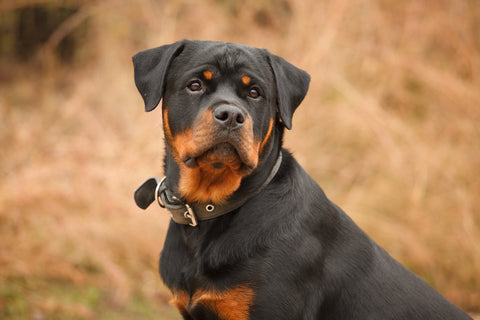 Common Issues: After centuries of genetic diversity and responsible breeding practices, Rottweiler stock is generally healthy and only has a handful of predispositions to be aware of. Regardless of your dog’s genetics, regular veterinarian visits are an essential part of a long and healthy life.
Common Issues: After centuries of genetic diversity and responsible breeding practices, Rottweiler stock is generally healthy and only has a handful of predispositions to be aware of. Regardless of your dog’s genetics, regular veterinarian visits are an essential part of a long and healthy life.
Rottweilers are predisposed to osteosarcoma, a cancerous bone tumor, which your veterinarian can speak to more thoroughly. As with most large breeds, they are also prone to hip dysplasia wherein an abnormality in the joint tissue leads to pain and inflammation. Joint support at all ages is a critical part of staying healthy, and a joint supplement provides essential nutrients your dog needs. Exercise every day is also key, as it helps strengthen joints, muscles, and bones. Ask your veterinarian about hip dysplasia and for an outlook on your pet’s health.
 Nutrition: Every dog needs plenty of protein in their diet, which can come from beef, pork, poultry, and several other animal sources. Their food should be meat-based and contain added vitamins and minerals. Even commercial dog foods with added nutrients may be lacking essentials such as essential fatty acids and antioxidants. Veterinarians often recommend a canine multivitamin for puppies, adults, and seniors to ensure they get their daily recommended vitamins.
Nutrition: Every dog needs plenty of protein in their diet, which can come from beef, pork, poultry, and several other animal sources. Their food should be meat-based and contain added vitamins and minerals. Even commercial dog foods with added nutrients may be lacking essentials such as essential fatty acids and antioxidants. Veterinarians often recommend a canine multivitamin for puppies, adults, and seniors to ensure they get their daily recommended vitamins.
As cute as table-side begging may be, your dog’s diet should never include table scraps. Food intended for humans may contain ingredients such as spices or vegetables that are toxic to dogs, and even plain foods may cause digestive upset. For the occasional bout of diarrhea, gas, or upset stomach, a probiotic and digestive support supplement helps rebalance the gut and relieve symptoms.
A healthy, balanced diet is an essential part of your dog’s health, so be sure to invest in the supplements they need and high-quality food.
Lifespan: 9-10 years
Physical Activity
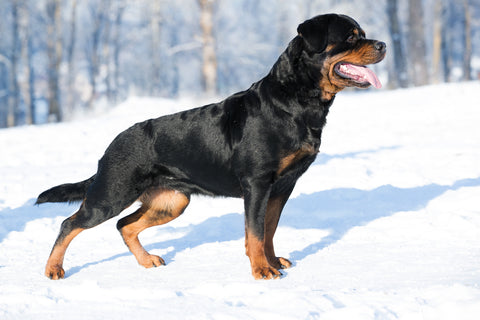 Training: Training a large dog is essential, as they can become rambunctious and unruly without the guidance of their owner. Rottweilers are intelligent and can be willful. This means they need a leader to follow, whether that is an older, well-trained dog or you, their human. Obedience training is recommended for all dogs, and Rottweilers are known to respond well to intense training, even so far as using hand signals instead of vocal cues.
Training: Training a large dog is essential, as they can become rambunctious and unruly without the guidance of their owner. Rottweilers are intelligent and can be willful. This means they need a leader to follow, whether that is an older, well-trained dog or you, their human. Obedience training is recommended for all dogs, and Rottweilers are known to respond well to intense training, even so far as using hand signals instead of vocal cues.
It is important to note that in the past, Rottweilers have been victims of sensationalized media and films casting negative light on the breed. In the early 2000’s, several films showed Rottweilers acting aggressive and malicious, despite a complete lack of evidence that the breed is aggressive. After the films’ releases, numerous media outlets began embellishing stories about Rottweilers biting or otherwise attacking people. To this day, this breed is subject to breed restrictions in apartment buildings and the like, but luckily, this negative narrative about Rotties is not as widely accepted as it once was. That being said, all Rottweilers, and all dogs for that matter, should be trained and socialized throughout their life.
Exercise: Rottweilers require plenty of exercise every day, typically one to two brisk walks and one to two play sessions. This ensures that they get physical exercise and mental stimulation, two key components of their wellness. Automatic and puzzle toys are great options to keep your Rottie occupied, even if you’re away. Without enough exercise and mental challenge, your dog can get bored and frustrated, resulting in destructive behavior, barking, or other unwanted actions.

Rottweilers are fiercely loyal, incredibly smart, and absolutely handsome. A Rottie brings a whole lot of activity, fun, and love into any family, and they will be ecstatic to help out on a farm, ranch, or stead. These canines have been one of human’s most beloved friends for centuries, and they remain so to this day.

